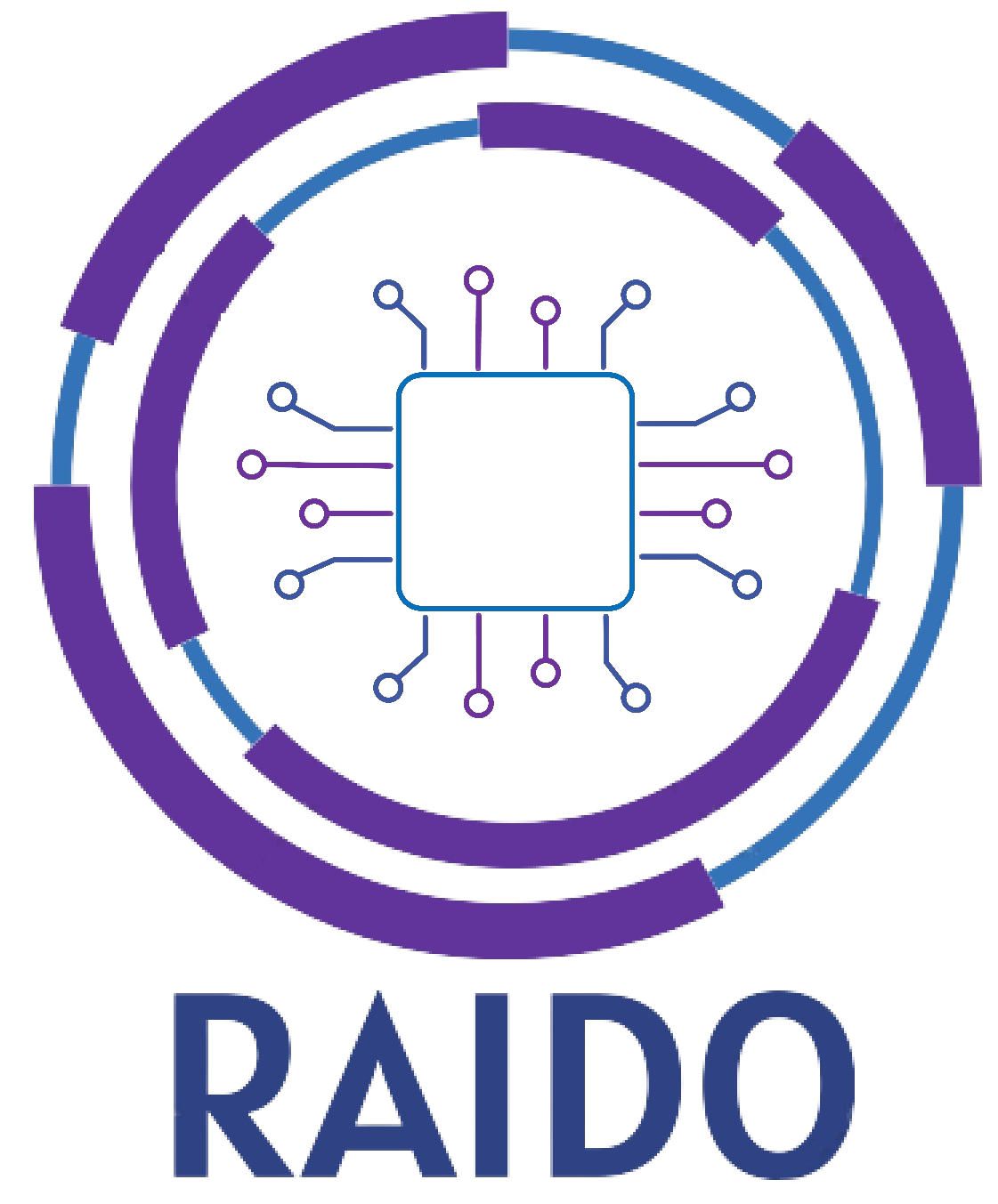
RAIDO: Reliable AI and Data Optimization
RAIDO provides an integrated platform offering a holistic, end-to-end development framework to design, build, optimise and manage trustworthy, explainable, reproducible, and evolvable ML-powered software, supported and trained with synthetically generated datasets. It is focused on streamlining the process of taking machine learning models to production, while optimising, maintaining and monitoring them using blockchain and reinforcement learning technologies. RAIDO aims to unify the release cycle for machine learning optimisation and data enrichment processes. The proposed platform will enable automated testing of machine learning models and verification in terms of energy efficiency
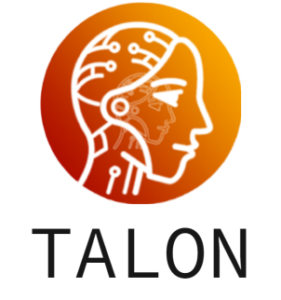
TALON - Autonomous and Self-organized Artificial Intelligent Orchestrator for a Greener
Industry 5.0
This project will sculpture the road towards the next Industrial revolution by developing a fully-automated AI architecture capable of bringing intelligence near the edge in a flexible, adaptable, explainable, energy and data efficient manner. TALON introduces solutions based on and AI orchestrator and Digital Twins supported by AR/VR technologies offering automation through collaborative and/or autonomous robotics, intuitive robot programming, and human robot user-friendly interaction.
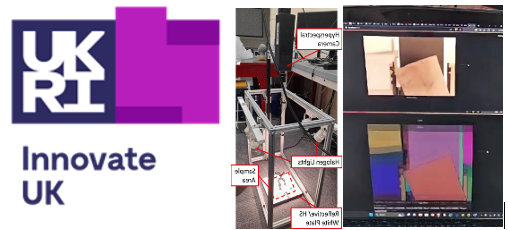
Re Fibres - Using advanced deep learning, computer vision models, multispectral
sensors & automated robotics to develop an end-to-end UK recycling framework for
textile waste
Kingston University working in partnership with offcuts company KAPDAA, textile sorter Choose2Reuse CIC and University of Leeds, is developing an end-to-end textile recycling system offering solutions based on advanced AI and computer vision solutions, supported by robotics that can handle soft materials.
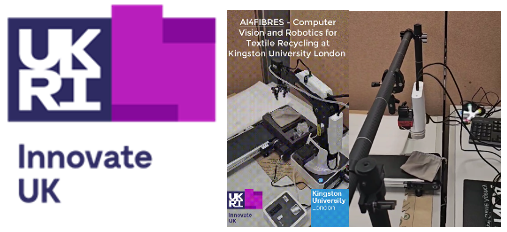
Portable AIFIBRES - Portable Artificial Intelligence for Textile and Fibres
Recycling
Kingston University working in partnership with offcuts company KAPDAA, textile sorter Choose2Reuse CIC and large charity, Royal Opera House, is developing Ai4Fibres - the world's-first portable plug-and-play recycling system for garments and fabrics. The system will scan, sort, and segregate 10 tonnes of garment waste per week and will use advanced AI to address critical inefficiencies in the current garment/fabric recycling process.

SirenPod AI-powered Honeypot for IoT Devices (Phase 2)
In this project, it is proposed to develop the next generation of honeypots – the SirenPod – that will simulate the behaviour of real healthcare and medical devices. Consequently, not only will SirenPod be able to detect and analyse such attacks, but it will operate as a decoy to attract attackers away from real-value medical devices. The proposed SirenPod will deliver significant advances over the state of the art: using Artificial Intelligence to improve both current deception efficiency in interactions with attackers and actual system emulation, the SirenPod will completely address the needs of current industrial and healthcare equipment while offering flexible and extensible designs for future capability expansion.

SirenPod AI-powered Honeypot for Medical Devices (Phase1)
In this project, it is proposed to develop the next generation of honeypots – the SirenPod – that will simulate the behaviour of real healthcare and medical devices. Consequently, not only will SirenPod be able to detect and analyse such attacks, but it will operate as a decoy to attract attackers away from real-value medical devices. The proposed SirenPod will deliver significant advances over the state of the art: using Artificial Intelligence to improve both current deception efficiency in interactions with attackers and actual system emulation, the SirenPod will completely address the needs of current industrial and healthcare equipment while offering flexible and extensible designs for future capability expansion.
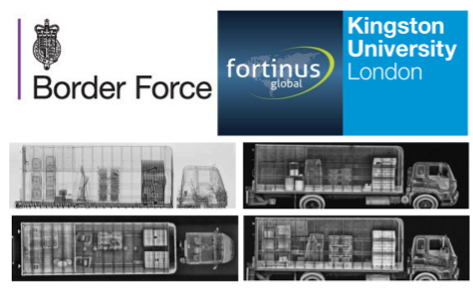
Behavioural Detection Capability at Border Force
Kingston University working in partnership with Fortinus Global, on solutions and technical requirements for behaviour detection using AI, and computer vision supported by a variety of sensors.
KAPDAA - Post consumer waste stripping automation
This project will offer processes that automate the detection of fabric elements such as zippers / buttons using a mechanical process through novel manufacturing, artificial intelligence, and machine learning techniques. The overall aim is to significantly improve the processing and cutting time allowing to process more post-consumer waste into new fibres hence resulting in new recycled products for the consumers. Our contribution is on the design and development of AI and computer vision solution to analyse fabric and detect materials or related parts.
UAV Scene Analysis
This project will provide Deep Learning solutions for scene analysis and object recognition from aerial data supporting multiple conditions and camera positions.
5G Rural Integrated Testbed (5GRIT)
This project will provide partner companies the chance to test out their applications in managed network environments with real people. The testbed consists of the Quickline and Broadway wireless networks (leading ISPs), trials managed by Cybermoor (leading social enterprise), and use case developers which providing unmanned aerial systems (UASs) to collect video data on livestock movements which will be analysed by Kingston University (KU); precision farming; new rural broadband delivery; augmented reality for tourists. This will lay the foundation for other organisations to trial innovative applications and technologies on the testbed in future years.
WITNESS - Wide InTegration of sensor Networks to Enable Smart Surveillance
WITNESS proposes an innovative framework for situational awareness and decision making, to improve the effectiveness of security forces in preventing and dealing with an urban attack. This project is in collaboration with partners from the Republic of Moldova and Italy. Our work is focused on computer vision tasks related to scene analysis and understanding with further application in AR.
MIDAS - Control of team of mini-UAVs to support counter-terrorism missions
This a NATO funded project started in January 2018 focusing on counter-terrorism scenarios using control systems for mini-UAVs, machine learning and computer vision solutions.
Knowledge Transfer Partnerships Ref: KTP010695
A KTP project started in 2017 with VCA Technology Limited for two years focusing on pedestrian counting and simulation systems for security and market analytics. Computer vision and machine learning techniques based on deep learning will be developed and evaluated during this project.

MONICA - Management Of Networked IoT Wearables - Very Large Scale Demonstration of
Cultural & Security Applications
The SoundCity Project MONICA aims to provide a very large scale demonstration of multiple existing and new Internet of Things technologies for Smarter Living. The solution will be deployed in 6 major cities in Europe. MONICA demonstrates a large scale IoT ecosystem that uses innovative wearable and portable IoT sensors and actuators with closed-loop back-end services integrated into an interoperable, cloud-based platform capable of offering a multitude of simultaneous, targeted applications.